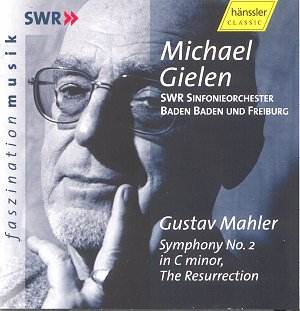Gustav MAHLER
Symphony No.2 in C minor "The
Resurrection"
György KURTAG
Stele op 33 for large orchestra
Arnold SCHÖNBERG
Kol Nidre op 39* for speaker, choir and orchestra
 James Johnson (Speaker)* Juliane Banse (Soprano)
James Johnson (Speaker)* Juliane Banse (Soprano)
Cornelia Kallisch (Alto) EuropaChorAkademie
SWR Radio-Sinfonieorchester Baden-Baden und Freiberg
Conducted by Michael Gielen
 Hänssler Classic CD
93.001 [107.28]
Hänssler Classic CD
93.001 [107.28]
Amazon
UK
Amazon
US

I think Gielen's new Mahler 2nd is one of the greatest Mahler recordings
of recent years, and one of the best recordings ever of the 2nd.
People familiar with Gielen's many excellent recordings with his "hometown"
SWR Orchestra on Intercord and EMI will know broadly what to expect. Gielen
is an eminently sensible conductor, not given to expressionist excesses.
In some quarters, this has given him - quite unfairly - the reputation of
being capable but a little dull. To my ear, he is a master musician, with
an ability to communicate long lines and to shape large structures. Mahler
2, in all honesty, is not the most closely-knit of symphonies, and it can
sound disjointed and episodic. In Gielen's hands, it seems like a structural
masterpiece, with each movement and episode relating naturally to the others.
This also means that individual episodes are not necessarily as explosive
or gripping under Gielen as under Solti or Bernstein. But this cost is repaid
when the true climaxes make their full impact, undiminished by comparison
with overexcitability before or after. Tempos are broad, but never to the
point of dragging. In many respects, Gielen's interpretation has much in
common with Klemperer's and Haitink's, which are also in a sense
"noninterventionist" but highly effective.
Where Gielen scores over everyone else is in the technical aspects of his
recording. His orchestra is simply wonderful, playing with precision, security,
power and refinement throughout. His choir, the EuropaChorAkademie, may be
the best ever in this piece; their phrasing and balance is exemplary, especially
during the quiet a capella moments. His soloists are fine: Kallisch is excellent
in "Urlicht", and Banse gleams nicely during her brief soaring moments in
the finale. Finally, the recording (made in 1996) is first rate, as are all
the SWR productions. The performers are heard at a middle distance, in a
rather large and grand acoustic. Individual lines don't leap out as they
do with, say, Solti, but the mass and blend of the sound is very well
captured. Only the organ at the very end is a disappointment -- too recessed
and with the deep pedals largely lost. The strings are divided, as with
Klemperer, which pays big dividends at the many times when Mahler treats
the violins antiphonally.
The set is completed with Kurtag's "Stiele" and Schoenberg's "Kol Nidrei".
Both seem finely done, but neither is a piece I know well enough to offer
detailed criticism. I only wish that the disc had placed these first, so
that the break could come after the "Totenfeier" movement; you really need
a break at that point.
The booklet notes, by David Hurwitz, are exceptionally detailed and useful.
A winner.
Tony Movshon
See also Tony Duggan's review
